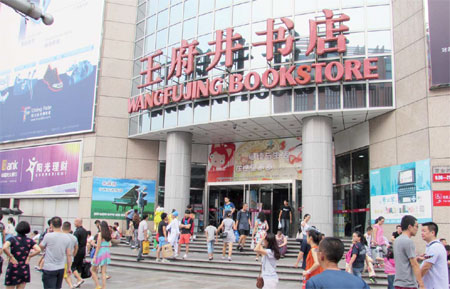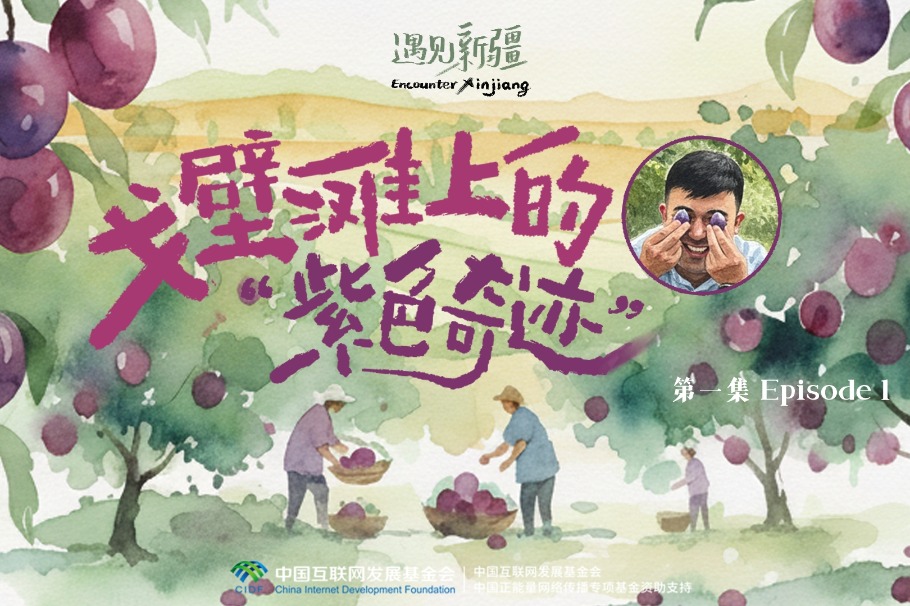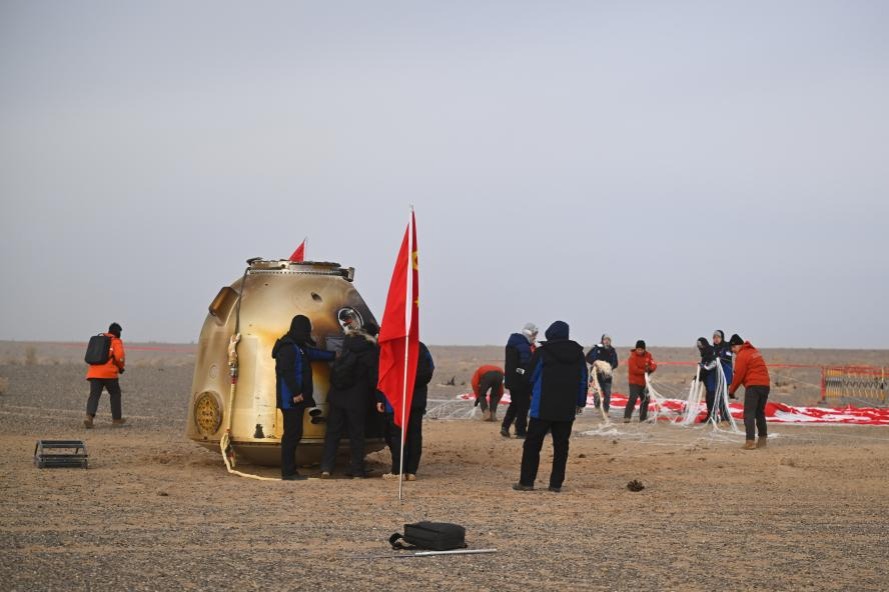Gilded age for African writers


| Top: The Wangfujing Bookstore in Beijing. Above: Chimamanda Ngozi Adichie's award-winning novel Half of a Yellow Sun on the shelves at Wangfujing Bookstore. Photos by Philip Etyang / for China Daily |
Translations put continent's literature into the hands of Chinese readers
The past five years have been memorable for African fiction in Chinese and Chinese fiction in English, as the availability of good translations grew and students became more interested in books from other cultures.
Some masterpieces have been available for a long time. The magnum opus of the Nigerian novelist Chinua Achebe, Things Fall Apart (1958), was first translated into Chinese in 1960 and has been reprinted several times, the latest being in 2011. Many consider Achebe to be the father of modern African fiction written in English. Chongqing Publishing House has translated Arrow of God, Anthills of the Savannah, Things Fall Apart and A Man of The People.
But translated works of fiction by Achebe and many other African writers are now stocked by Wangfujing Bookstore in Beijing. They have been translated into Chinese, and the original English versions are available, too. In the shop's foreign-language literature section three young Chinese studying at Beijing Union University sit on the floor reading the Chinese translation of Ben Okri's The Famished Land (2003). Okri is another award-wining Nigeria novelist, and The Famished Land was originally published in 1991.
One of the students, Ji Yanan, says she has always been fascinated by African fiction and goes to the shop on Saturdays to read a chapter of the translated African books.
"I can read and speak English but I prefer reading the Chinese translations of African fiction because I understand them better in my native tongue. The Famished Land is very interesting."
Translated books of African fiction available in the store include works by Wole Soyinka, the Nigerian who was awarded the Nobel Prize in literature in 1986. The include Ake: The Years of Childhood; Death and the King's Horseman; and A Big Airplane Crashed into the Earth (Poems from Prison).
Other notable writers whose books have been translated into Chinese and that are available in the shop include the South Africans J.M. Coetzee and Nadine Gordimer and the Kenyan Ngugi wa Thiong'o.
The translations are not only limited to the so-called fathers of modern African fiction. Latter-day writers such as Adichie Ngozi Chimamanda and Chika Unigwe, both of Nigeria; Binyavanga Wainaina, of Kenya; and Laila Lalami, of Morocco, have had their books translated into Chinese as well.
Other notable writers of African fiction whose books have been translated into Chinese include the poet Keorapetse Kgositsile, of South Africa, Ama Ata Aidoo, of Ghana, and Joyce Chigya of Zimbabwe.
A sales assistant surnamed Si in Wangfujing Bookstore says that among the recently translated books, those of Chimamanda Ngozi Adichie have been selling particularly well.
"In 2011, the most popular African books translated into Chinese were by Chinua Achebe. Today, Adichie's books are in high demand. Both the original and the translated versions are selling very quickly."
Adichie has been widely regarded as the daughter of Achebe, having grown up in the same house in which Achebe lived in Nssuka, Nigeria. She burst onto the literary scene in 1997 with a collection of poems titled Decisions. After the publication of her first novel, Half of a Yellow Sun (2006), he paid a glowing tribute to Adichie, saying: "She emerged almost fully made," in reference to her depiction of the Biafran War in Nigerian in the late 1960s.
Books of China's Nobel laureate Mo Yan have been translated into English by Howard Goldblatt, widely regarded as one of the best translators of modern and contemporary fiction in Chinese. He has translated nine of Mo's fiction books into English.
Goldblatt, now retired, and who was a research professor in the Department of East Asian Languages and Cultures at the University of Notre Dame in the US, won the Man Asian Literary Prize twice, in 2007 and 2009, for his translations of Wolf Totem (2004) by Jiang Rong and The Boat to Redemption (2009) by two-time nominee of the Man Booker International Prize Su Tong.
Goldblatt has translated more than 40 works from Chinese into English but his greatest recognition has come from translating Mo's book Red Sorghum which introduced him to the non-Chinese speaking world.
Mo, who won the Nobel Prize for Literature in 2012, is prolific, having published well over 20 books and won several awards.
The growth of African literature in China has been significant in the recent past, and courses in African literature have been introduced at Peking University. Professor Femi Osofisan, a Nigerian playwright and visiting professor, says his students are very keen on learning about African fiction. There are several challenges in teaching translated works of fiction, he says.
"I enjoy teaching at Peking University. This is at master's level, and the students are very keen and interested. I teach mainly theater and occasionally fiction. My colleague from Harvard, Biodun Jeyifo, teaches fiction and drama."
On teaching translated works of African fiction, he says some of the translations, especially those of Chinua Achebe's, have fallen short.
"However, the problem has been, first, getting the needed books, and second, the obvious limitation of the students in their mastery of English."
The third problem is translation.
"Every so often I have discovered in class that some of the translations are wrong."
Osofisan, who has 11 published books to his name, says that because of the growing number of Chinese interested in studying African fiction, plans are afoot to introduce an undergraduate class in African literature next semester. Professor Wei Liming, head of the department, has been pushing for expansion in the area.
Biodun Jeyifo, a visiting professor from Havard University, agrees with Osofisan on the enthusiasm of the students in learning African fiction. Chinese students are much like students he has taught elsewhere, he says.
"To my great delight, I have found that my Chinese students are no different from my students at Harvard and the students that I have taught at Nigerian universities (Ibadan and Ife). They first have to be made to realize they have what it takes to learn at high powered and prestigious institutions, and once that happens, their curiosity and energy are boundless."
Jeyifo, an expert in African and American literature studies as well as comparative literature, says the study of Africa in China is more concentrated in social sciences.
"The academic study of Africa and Africans in China is much stronger in the social sciences than in the arts and the humanities, and what we have started at Peking University is just a beginning. But so far, it has been a very auspicious beginning. Professors Wei Liming and Li Anshan have been tremendous in their initiative, and the students have been very commendable."
Wang Shang, a doctorate student of Asian and African languages and literature at the university, says she studied several Chinese-translated books by African writers in her undergraduate degree, when she studied comparative literature.
"I have read several books by different African authors. Most of them were translated into Chinese. They include Chinua Achebe's A Man of the People, Things Fall Apart, Arrow of God and African Short Stories."
Wang says that when she studied comparative literature, she found African fiction to be very similar to that of Latin America.
"In some ways their writings have some similarity with Latin American literature, but mostly, of course, they have very strong and special African elements. I think African writers have a better way of writing history and tradition, as well as their own culture than Chinese contemporary writers."
For China Daily
(China Daily Africa Weekly 08/29/2014 page16)
Today's Top News
- China reports 5% GDP growth in 2025
- Return capsule of Shenzhou XX safely returns to Earth
- Sanya rises as magnet for Russian tourists
- China's steady opening-up for Asia-Pacific economic growth
- Blueprint seen as a boon for entire world
- 'Kill line' an inevitable outcome of US system






























